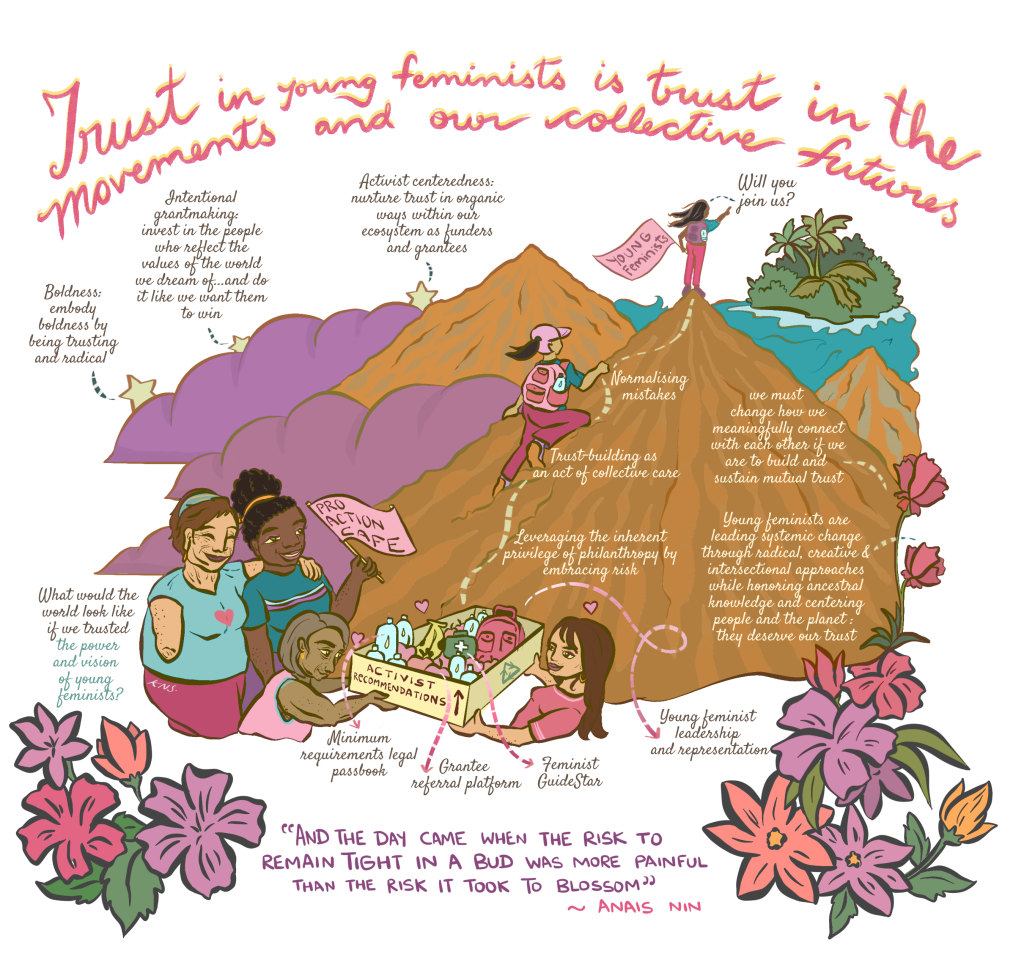When we think about the ways that philanthropy has worked historically, what we’ve heard from and shared with young activists during the Pro-action Cafe (a community space for open conversations about the practice of resourcing girls and young feminists in crises), we have a clear conclusion: we must change how we meaningfully connect with each other if we are to build and sustain mutual trust.
In the midst of a catastrophic pandemic, compounded with multiple crises, we hold with appreciation the ways in which we began to question the structures around us which have allowed us to do the ‘impossible’ – centring trust and agility, welcoming flexibility, and decreasing what was considered a must (such as tedious applications and reports). In figuring out our new world, we have proven that we can change things for the better. What if this became the norm?
As we all hold certain tensions and discomforts, we acknowledge that there are a few things we could do differently.

Artwork by Kruthika NS
Current opportunities
Activist Centeredness: The saying goes, birds of a feather flock together. As both of us have gathered different experiences in life, we’ve realized that this saying, in so many ways, can be a box that’s quite exclusive and lonely. In our journey in philanthropy as activists and advocates, we are learning that it is our responsibility to go the extra mile, to break the box, to consider other forms of movement in order to expand our world and our tables – an example is by creating activist-led boards and participatory grantmaking practices. We know that when we embrace our differences and still recognize our interdependence, we nurture trust in organic ways within our ecosystem as funders and grantees.
Boldness: Both our cultures have rich folklore that teaches courage and boldness despite the imminent danger of speaking up. As activists, advocates, and program implementers, it was scary to be bold and say exactly what we needed. We want to name this fear that is shared across the community. For too long, the philanthropic space has enjoyed almost unchecked power. What if we acknowledged the power that grantees and activists hold and made space to experience the magic of their power beyond the typical frameworks (which have clearly not worked)? What if we enthusiastically accepted critique and worked with the same agility that activists do every day?
We dream of having more spaces where activists and funders come together for bold, politically incorrect conversations that defy the pitfalls of power that exist between us. Funders can begin to embody boldness by ensuring that decision-making spaces, such as activist-led boards, represent the communities with lived experiences as they hold the solutions to their own challenges.
Intentional grantmaking: As Dani Priscariu shared, young feminist activists are the experts of their environment and context. ‘To truly support their brave and resilient work, we must do it in ways that meet the urgency of what they are facing (such as systemic oppression, the rise of persecution due to their identities and work, global pandemic, and erupting crises). The reality is that if we truly want a just and thriving world, we must invest in the people who reflect the values of the world we dream of. And, do it like we want them to win. Flexible and multiyear funding and removal of ineffective practices (such as applications and reports that ask for unnecessary information) represent a great start’.
Deeper explorations
Trust-building as an act of collective care: We know there is a glaring under-investment in both young feminist organizing and in collective care efforts. Imagine if more funders prioritized young feminist collective care initiatives and celebrated healing. In openly funding young feminist-led collective care without restrictions, we are honouring their wisdom and dreams. We are supporting ideation, innovation, experimentation, and ultimately, trusting one another to dream big. Imagine the possibilities if more funders, and philanthropy as a sector, viewed trust-building as an act of collective care.
Leveraging the inherent privilege of philanthropy by embracing risk: Unfortunately, it took a global pandemic and multiple ongoing crises for philanthropy to be willing to take more risks. Even so, we have a long way to go in transforming the sector and in truly listening and responding to movement needs, especially during crises. Some funders have established more permanent emergency funding mechanisms and engaged in mutual aid efforts while others have simplified application and reporting requirements to offer flexibility. Another example comes from The Global Resilience Fund which stepped out of the business-as-usual models to find new ways to move flexible resources to girls and young activists responding to the pandemic.[1]
How can we incorporate the lessons from the pandemic into more long-term strategies that allow for risk and trust to be integral to philanthropy and to resourcing young feminist activism and organizing? When are we willing to take risks and when are we not, and how does risk intersect with trust?
Normalising mistakes: In our ProAction Cafe community, young feminist activists shared that groups fear sharing challenges and mistakes with funders because it may lead to an end or decrease in funding. By avoiding discussions about challenges and mistakes, we’re doing a disservice to young feminist movements and solutions. In the spirit of trust and transparency, we should be sharing our own mistakes and challenges as funders (eliminating the unreal expectation of perfectionism), and providing support and accompaniment to groups that share mistakes and challenges.
What would it look like to normalize mistakes and take responsibility as funders, partners, activists, advocates, and organizers? How can we welcome asking for help and sharing challenges with no repercussions or judgment?
Activist recommendations
While we invite peers to explore the above alongside us, we also want to move beyond conversations to concrete actions, which was what the ProAction Cafe was all about. During our time in the community, young feminist activists shared what they want and need when it comes to trust, including:
- Feminist GuideStar: an online platform where grantees can showcase their work and funders can easily find groups to fund based on themes and country focus.
- Minimum requirements legal passbook: a shared knowledge resource that details what funders can or cannot ask from a potential grantee to reduce the application and reporting burden on young feminist grantees.
- Grantee referral platform: a mechanism where grantees can refer other groups for funding, and funders trust the grantees experience and insight.
- Young feminist leadership and representation: moving beyond inclusion by ensuring young feminists have meaningful representation and decision-making roles across boards, advisory groups, committees, donor collaboratives, etc.
We must engage in more candid conversations with young feminist activists and their movements in order to listen, learn, and better understand their experiences with trust or lack thereof, and co-create strategies that bring us closer to becoming a more trusting ecosystem. We also acknowledge that there is no perfect equation for trust, it’s an ongoing journey that we must commit to, and this is just the beginning.
In the midst of an ongoing global pandemic, climate change and continuously bursting crises where young feminist activists are at the frontline responding and leading transformative work with less than one per cent of global funding, how can we show up with the same bravery to co-create the world we seek?
We want to move past dreaming of what the world would look like if we trusted the power and vision of young feminists to begin to realize it today. Trust in young feminists is trust in the movements and our collective futures. Will you join us?

Artwork by Kruthika NS.
Purity Kagwiria is a feminist activist and a storyteller based in Nairobi, Kenya. She is the Director of the With and For Girls Fund and Collective. Juliana Vélez Uribe is a feminist advocate currently working as Global Program Officer at Foundation for a Just Society.
This piece was illustrated by Kruthika NS, lawyer and social justice artist @theworkplaceDoodler.
This article was originally published by the Global Resilience Fund on 21 February 2022. It is being re-shared in Alliance with permission, as a part of a series on trust-based philanthropy.







Comments (0)